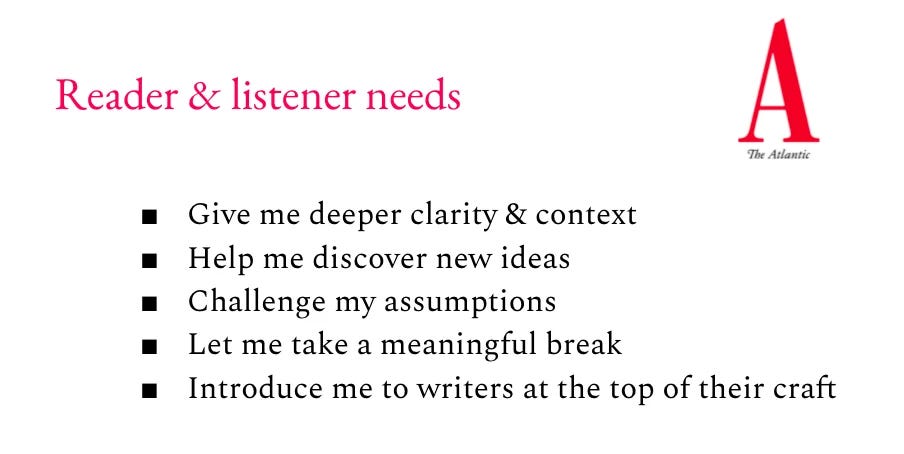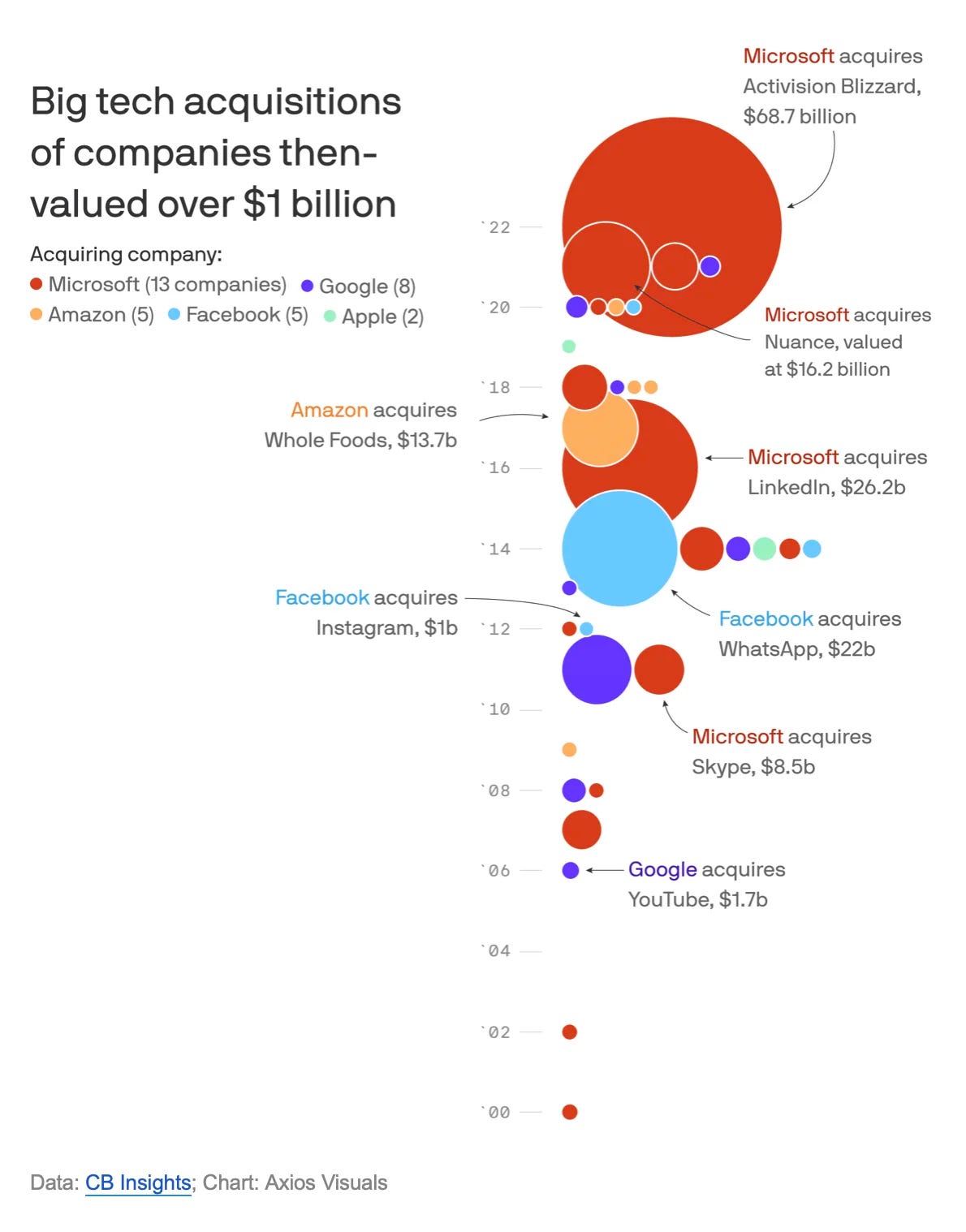📺 The one thing smart TVs still miss
Spoiler alert: Why is it so hard to build in a damn camera on the television?!
👋 Welcome to FWIW by David Tvrdon, your weekly tech, media & audio digest.
In this edition
The smart TV industry keeps ignoring the smart home needs
Google Analytics might be in breach of GDPR
Sony and Washington will not be happy with Microsoft’s latest acquisition
Why do TV manufacturers keep ignoring the smart home reality?

There were two things that tech sites went crazy about after CES 2022: a smaller 42-inch LG TV and QD-OLED displays (panels with a quantum dot organic light-emitting diode).
Last year, there was the 8K-hype which has almost disappeared this year with a few exemptions. This year’s CES wasn’t big on futuristic TV design and there was also something else missing.
When it comes to TVs, I’m not a display nerd. I’m not saying I can’t see the difference between different technologies - OLED, MicroLED and soon to go mainstream QD-OLED.
But the thing that frustrates me about the TVs we have today in our living rooms is the lack of the “smart” element they promise in their name category - smart TVs.
When looking at Google Trends search results, “smart home” search worldwide has peaked in 2018 with 2016 getting some real traction.
In other words, we are more than 5 years in globally, hundreds of millions of people have a smart home device at home and the TV industry is almost ignoring what is happening in the living room.
We are two years into the pandemic and I haven’t even seen a real concept of a smart TV that accounts for some of the new realities. Even if it didn’t get all the things right, there would at least be a discussion, but there is none.
Sure, you can talk to your smart TV, install apps and play cloud streaming video games. What I lack the most is something even Facebook (now Meta) together with Google and Amazon has thought of - making video calls.
Just put an ultra-wide camera on the TV with a decent mic and you have the perfect device for video calls in your living room. Today, even iPads are able to do this.
OK, a younger family might prefer a more portable solution like the camera-based smart speakers from Amazon or Google or an iPad. But there is, I think, a huge opportunity in the “grandparents market”.
The older generation is not especially eager to have a “listening” device at home, voice-only control might be uncomfortable. But a TV is something they are familiar with and already spend most of their free time anyway.
You might say, that this generation is already familiar with smartphones and you are right. But most calls with the older generation (via a smartphone) end up with you watching your grandma’s forehead.
I realize I might be missing something here. Surely this had to be at least a topic at some managerial meeting at LG or Samsung.
Anyway, if you know why this has not happened yet, just hit reply. I'm dying to know.
TECH
🥸 Apple's mixed reality headset faces problems and delay of launch into 2023. The device is overheating, has problems with the camera and software. More than 2,000 Apple employees are now working on its VR and AR hardware. In recent months, Apple has seen a number of engineers from the unit leave for jobs at Meta. The company responded to the departures by offering key engineers one-time restricted stock unit bonuses worth as much as $180,000. [Bloomberg]
ALSO: Apple said it would allow developers of dating apps in the Netherlands to offer non-Apple payment options to their users, complying with an order from the country's market regulator.
📺 What’s the future of Google TV? Google TV Director of Product Management Rob Caruso (who previously worked at Netflix) in an interview said it may get fitness, smart home capabilities and more this year. The company revealed at CES that there are now 110 million monthly active Android TV devices in the world. [Protocol]
😟 Austrian website’s use of Google Analytics found to breach GDPR. A decision by Austria’s data protection watchdog upholding a complaint against a website related to its use of Google Analytics. The regulator found IP address data to be personal data given the potential for it to be combined — like a “puzzle piece” — with other digital data to identify a visitor. And as it is sent to US cloud services, it violates Chapter V of the EU’s General Data Protection Regulation (GDPR), which deals with data transfers out of the bloc. EU law says European levels of protection must travel with data, which is not the case with Google. [TechCrunch]
💡 Still confused about the web3 discourse on the internet? Here’s a helpful explainer. [Bloomberg]
🤑 Instagram launched an early test of creator subscriptions in the US. Through the Subscriptions product, creators can choose their own price point for access to their exclusive content. There are eight different price points to choose from, starting at $0.99 per to month to as much as $99.99 per month. Instagram won’t be taking any cuts until at least 2023. [TechCrunch]
😵 Tumblr is having an unlikely comeback among Gen Z. The social-media platform’s status as a relic of the Internet has attracted prodigal users as well as new ones. Many users cited they prefer Tumblr because of its chronological feed, not algorithm-based. [New Yorker]
MEDIA
👀 How independent, free media in Eastern Europe is being silenced. Stories from Serbia, Poland and Hungary. The common denominator being the government is finding ways of running independent media out of business besides throwing journalists in jail. This was a sad read. [NYT]
👍 The Atlantic published its reader and listener needs card. Why should you care? It’s not meant to be copied (your audience surely has different needs from their publication). But what’s interesting is the backstory Emily Goligoski, executive director of audience research at The Atlantic describes. Also, the newsroom uses this card (see below) to produce better content, some have it as a sticker on the computer monitor. [BTA]
💬 A new report looked at available literature about echo chambers, filter bubbles, and polarisation. As the authors conclude, in summary, the work reviewed in the report suggests echo chambers are much less widespread than is commonly assumed, finds no support for the filter bubble hypothesis and offers a very mixed picture on polarisation and the role of news and media use in contributing to polarisation. Which begs the question: What then makes people go so crazy (eg. anti-vax movement)? [RISJ]
🎥 YouTube is shutting down its division for original programming. Over the years, the video platform has made several attempts at building out its own original shows and none have been very successful (there are some exceptions like Cobra Kai which Netflix bought and it’s now a Netflix original). [WSJ]
FROM THE FIX
1️⃣ Ben Smith’s new venture and the deceptive appeal of educated, cosmopolitan audiences
2️⃣ Let’s start 2022 by questioning your newsroom’s business model
3️⃣ The death of news has been greatly exaggerated
4️⃣ Railway Modeller highlights the revenue potential of digital back issues
[ 📬 Get The Fix newsletter delivered to your inbox every week with the latest insights, news, and analysis about the European media market. Sign up here > ]
AUDIO
🎙️ Newsrooms are loving Twitter Spaces and experimenting with them. Twitter has a good primer on using the feature. [NiemanLab]
🙊 A meta-analysis of 2021’s top podcasts lists. No surprise, true crime rules, exclusive podcasts (behind a paywall or only on Spotify) didn’t make the top charts, and even though society and culture dominate, it is an all-encompassing category with a big mix. [PC]
🗣️ An NPR reporter got her voice cloned and the synthetic voice sounded almost indistinguishably. The company behind the tech is called Speech Morphing. [NPR]
GAMING
😮 Microsoft is buying Activision Blizzard for $70bn. The gaming company is one of the world’s most valuable with nearly 400 million monthly users and owns giant titles like Call of Duty, World of Warcraft, and Candy Crush. Microsoft has been moving away from its console business to a Netflix-style subscription model called GamePass which has 25 million subscribers by latest public numbers. Activision Blizzard has been in the news a lot lately because of a scandal about harassment, discrimination, and intimidation. Also, interestingly, the antitrust angle of the story is going to be interesting and we will see how much more scrutiny is directed from Washington at Big Tech in case of acquisitions that, just a few years ago, would have been approved without much scrutiny. [Vox, Axios]
Other than the government, there is at least one other group not happy about the deal, Sony shares fell 13% in Tokyo after the announcement, their biggest drop since October 2008
Here is a great chart by Axios showing how big of a deal this is.
❓ Poll: Would you buy a smart TV with video call capability? (built-in mic & camera)
I don’t need it, my whole family uses smartphones to do videocalls.
I don’t need it, already have a smart speaker with camera and it works fine.
🙌 Thanks. I used HandyPolls to create this poll (instructions).
Last poll results: Do you plan to buy an electric car? 25% are waiting for them to become more affordable, 17% are fans but haven’t given it a thought yet, 15% don’t drive. And let me say Hi 👋 to the six subscribers with a Tesla.
🙏 And big thanks to Celine Bijleveld who helped me edit this newsletter. You can follow her on Substack here.







